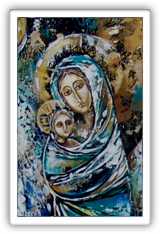|
|
Comprehending Medjugorje : Original Documents And Conversations with Arnaud Dumouch
The Franciscans
Reference (French Edition) :
Daria Klanac, Comprendre Medjugorje : Regard historique et théologique, avec la collaboration du théologien Arnaud Dumouch, Informativni centar Mir, Medjugorje, en coédition avec les Éditions Sakramento, Paris, 2012, 2e éd. (1re éd. 2008, ISBN 978-2-915380-19-4 & 978-9958-36017-6), entretien avec le théologien Arnaud Dumouch, pages 136 à 138.
English Translation by Duško Čondić
The Franciscans
Daria Klanac : The superiors of the Hecegovinian Franciscan Province that is in charge of the parish in Medjugorje have always supported their brother friars that are pastorally active in the parish of Medjugorje. The Franciscan Father General in Rome, on his visit to Medjugorje, also praised his brother friars on their excellent pastoral work in that place. A prohibition against publicly speaking about Medjugorje was not at issue. Changes in personnel are decided in their main assembly, their Capitular Assembly or Chapter, as it is sometimes called. The Franciscans in Medjugorje, therefore, did not violate their vow of obedience to their superiors?
Arnaud Dumouch : That is important to make note of. Yes, indeed… I wish to express that more clearly. Obedience as linked to religious vows is an evangelical recommendation and not a command. Therefore, obedience is in the service of Love, and not before it in importance. Inasmuch as the rule of Love takes precedence over obedience, there can be circumstances were formal disobedience within the framework of one’s vows, could be seen as being necessary. In this instance, I am thinking of the incident involving the choice made by Father Marie-Dominique Phillippe who formally and in a concrete fashion abandoned his vow of obedience and went on to found a new religious order, ( The Society of Saint John). If you view the film entitled: “The Mission,”[19] you will also see that two Jesuits reject obedience. In the circumstances as described within the story line of the film, they could not act in any other manner. They would have abandoned their flock by orders of their superiors. But, Jesus said: “A good shepherd gives his life for his sheep.” Hence, those who think that disobedience, in and of itself, is the criterion that is to be used to declare the apparitions as invalid, deceive themselves. Matters are far more subtle than that. One must look at existing circumstances, as well as at the conscience of those priests, etc.
D. Klanac : The difficulty lies at the diocesan level—as much for the priests in the parish who are all Franciscans, as it is for the visionaries. The parish of Medjugorje is dependent for its canonical authority on the diocese of Mostar. The local Bishop asks that the messages not be disseminated publicly since he considers them to be products of the imagination.
A. Dumouch : There is no doubt that in this instance, we are dealing with disobedience of the priests in the parish as regards the jurisdiction given them by the local ordinary. This is certainly their personal decision (which only concerns their conscience as men who are simultaneously correct or sinners) and it is not possible to discern the apparitions in themselves within those painful battles.
To the contrary, it is important for us to look to the behavior of the Gospa as it relates to those battles, so as to evaluate the apparitions. Does she instigate them? How are we to distinguish the behavior of the visionaries (namely, simple and civil) from the behavior of the Virgin?
D. Klanac : The Franciscans in Medjugorje, especially fra Jozo Zovko, fra Tomislav Vlašic, and fra Slavko Barbarić, (Died on the 24th of November, 2000), from the very start, and continuing even today, experienced and continue to experience the ire and attacks on the part of the diocese of Mostar as well as from other opponents of Medjugorje. Their opponents do not hesitate to broadcast their weaknesses publicly. They call them the authors of Medjugorje, manipulators, debauchees, nationalists, and the like.
A. Dumouch : That in no way can serve as a criterion for evaluating the apparitions themselves. That simply serves to prove that the friars fiercely believed in the apparitions from the very start, and that the Diocese of Mostar, subsequently came to fiercely reject the apparitions.
D. Klanac : In fact, if everything that is said at their expense were to be seen as being true, how would that affect judgement as to the credibility of the apparitions?[20]
A. Dumouch : Let us imagine that one can prove a conspiracy that has endured through the last twenty-eight years—a conspiracy between the priests in Medjugorje and the visionaries. Naturally, that would be the finish of it all. But, it seems to me, that possibility is impossible: no one is able to successfully engage in such conspiracy and manipulation that involves so many persons (some of whom are adolescents) and through so many years. One of the conspirators would sooner or later break down and speak out. This is even more obvious considering that the events of Medjugorje seem not to have brought them any benefit (money or enjoyment), but only difficulties. Fame, viewed in the long run, yields more worries than benefit.
19. By the British director, Roland Joffé, (1986), starring Jeremy Irons in the role of Brother Gabriel. [↩]
20. Les « créateurs » de Medjugorje, Medjugorje, réponses aux objections, p. 45. [↩]
